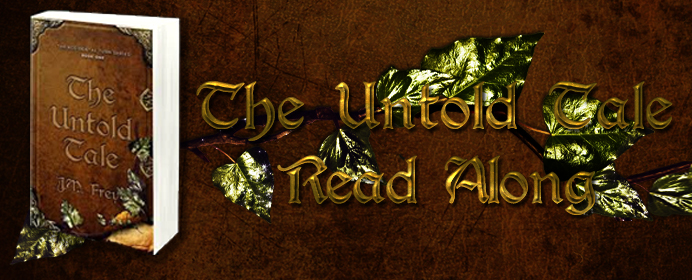
Welcome to The Untold Tale read-along! The Untold Tale by J.M. Frey is the first book in the Accidental Turn series, the second book of which, The Forgotten Tale, will be released on December 6th. To prep for book two, we’re sharing a ten-part series that will be part recap, part review, and part discussion of the book that has been called the “most important work of fantasy written in 2015.”
If you want to read along with us and avoid the SPOILERS that will follow, you can pick up your copy of The Untold Tale from major online retailers.
About the book
Forsyth Turn is not a hero. Lordling of Turn Hall and Lysse Chipping, yes. Spymaster for the king, certainly. But hero? That’s his older brother’s job, and Kintyre Turn is nothing if not legendary. However, when a raid on the kingdom’s worst criminal results in the rescue of a bafflingly blunt woman, oddly named and even more oddly mannered, Forsyth finds his quaint, sedentary life is turned on its head.
Dragged reluctantly into a quest he never expected, and fighting villains that even his brother has never managed to best, Forsyth is forced to confront his own self-shame and the demons that come with always being second-best. And, more than that, when he finally realizes where Lucy came from and why she’s here, he’ll be forced to question not only his place in the world, but the very meaning of his own existence.
Smartly crafted, The Untold Tale gives agency to the unlikeliest of heroes: the silenced, the marginalized, and the overlooked. It asks what it really means to be a fan when the worlds you love don’t resemble the world you live in, celebrates the power of the written word, challenges tropes, and shows us what happens when someone stands up and refuses to remain a secondary character in their own life.
Part One: “I assume the body is a corpse.” Chapters 1 and 2
Part Two: “Information, at last!” Chapters 3, 4, and 5
Part Three: “Your brother is a slimeball.” Chapters 6 and 7
Part Four: “It’s not cheating to know your enemy.” Chapter 8, 9, and 10
Part 5: chapters 11 and 12
V. Walker, with Cal Spivey
High off their success in obtaining the Quill that Never Dulls, Pip and Forsyth return to the taverna to celebrate. But chapter eleven starts out with Pip nearly having a panic attack, then delving into a conversation with Forsyth about race and class in the world. That conversation is shortly followed by Pip being harassed and groped by a strange man on the staircase.
The chapter ends with Pip and Forsyth having sex for the first time. It starts a little bit awkward and clumsy, as a first time between partners can be, but grows heated and passionate as Pip reveals that she’s not shy about her desire and what she needs.
But the fun doesn’t stop there. Oh no, that’s just one chapter.
Chapter twelve is a short one that finds Pip and Forsyth continuing to the next part of their quest. Pip once again confronts and dismantles a standard fantasy-genre favorite, this time by outsmarting a riddling raven.
They fall into a discussion about the relationship between Bevel and Kintyre, and the underlying homoerotic subtext between some of the greatest literary “bromances” – male friendships that are thisclose to being romantic or sexual but never quite get there, yet there’s “such strength of affection there that it reads with homosexual subtext” (p. 279). I’m sure we could all think of a few ourselves…
There is so much to unpack in these next two chapters (eleven and twelve), I don’t even know where to start. To reference a favorite, “Let me ‘splain. No, there is too much, let me sum up.”
The Untold Tale not only confronts the racism and sexism that tends to be popular within the fantasy genre, but J.M. Frey does it with panache and in a way that makes the reader want to do a fist pump in the air. It’s a masterful perspective that calls out so much of the fantasy genre about the lack of realistic diversity.
Yes, a fantasy world is just that…a fantasy. But what happens when you discover the fantasy world you’ve loved for years and used as an escape from reality is filled with the exact same class and power structures? It says that the author/world-builder isn’t as ‘uncomfortable’ with reality as perhaps is implied by writing a fantasy novel. Science fiction and fantasy can do more, imagine more, but so often does not.
Or, perhaps, the author wants to put the characters through the same tests and situations as a reader might face? But, if all the heroes in a series (or a large portion of the genre) are virtual copies of each other (see: white, able-bodied, cis, hetero, male) then how can all the potential readers feel a connection to the characters?
Answer: they can’t. Unless that’s exactly the reader that the author has in mind while writing; it puts a limitation on the experience of readers. Readers never learn to empathize with other experiences.
I don’t know about everyone else, but I read to escape and to experience situations that I would otherwise never be in. If I were to go back and re-read some of my favorites and discover issues within the narrative, I’d like to think I would start a discussion with other readers about it. And then I would expand my reading horizons.
The Untold Tale is very explicit in its call-outs. Some have complained about the blatant intersectional feminism in the taverna scene. But, really, is there any way but blatant discussion to have an impact on the othering techniques Frey calls out? My answer to that question is a loud & resounding NO. Just in case you were wondering.
As Pip puts it, “Why are the only people who are non-white also non-human?” After Forsyth tries to explain that there are “humans with darker skin down south,” Pip responds with “…All exotic others, and never the hero, eh?” *mic drop*
The taverna scene also shows us an instance of sexual harassment that is all too familiar to women and AFAB readers, where Pip is groped as she walks past a group of men on her way up to her room. I will admit that this scene got my blood boiling and it was masterfully written; having found myself in situations similar to this, Pip’s reaction is everything I wish I could have wanted from the scene.
But as affirming as Pip’s challenge to the men is, as Cal Spivey put it during a discussion, the scene that followed – when Pip and Forsyth retreat to their room and barricade the door – was heartbreakingly relatable. Any woman who has been sexually harassed or assaulted knows that, while we are confident and strong people, there is a level of fear few of us can really escape.
The next morning, Pip and Forsyth make love for the first time, an experience instigated by Pip–per her earlier request that Forsyth give her time, as well as his own inexperience. My favorite line of the chapter is Pip’s declaration: “I’m allowed to want it you know…I’m allowed to be a sexual person.”
In this section, Pip embodies one of the questions many people, especially women, deal with on a daily basis: how does the constant external sexualization, from harassers and society at large, interact with one’s own sexuality? How does it affect personal expressions of desire? Pip doesn’t want the attention of the men from the taverna and she makes her point quite clearly and eloquently; the next morning she makes it known to Forsyth that she does want his attention – and is not shy about owning her own pleasure.
Her declaration that she’s “allowed to want it” highlights one of the main struggles surrounding sexuality, desire, and sexualization: the consistent need to defend one’s choices, and the danger that can be present at that moment. Pip’s assertion of what she did not want–to be groped by strangers–was trivialized by those strangers. In a still more familiar progression, Pip’s continuing rejections of the groper were met with sexual slurs and threats of physical violence.
As she and Forsyth talk through what happened immediately after, he asks, “Don’t you deserve the adoration? Don’t you enjoy it? Is it not your right, as a woman?” In an absolutely perfect response, Pip says, “forcing me to engage when I just want to walk by…feels like grime on my skin, you know? Instead of a real compliment, which feels like…silk.”
There’s a confidence in both elements of this section, her rejection of sexual contact and her request of it, mixed with the fear and uncertainty that those she turned down would come back and take their pleasure anyway. It represents the fine line many of us are compelled to walk – one that Pip handles in a way that’s inspiring to readers.
J.M. Frey not only showcases the sexism of various popular fantasy worlds, but she created this meta-fantasy element of a Reader to confront them without hesitation, and then further deconstructs the issues during a conversation with a character of that world…the layers are astounding. It’s brilliant.
Coming up
In the next section, Pip and Forsyth tackle two of the Seven Stations, and their roles in the quest begin to solidify in a way that’s surprisingly reminiscent of…Harry Potter? Check out part seven of the Untold Read-Along, next Tuesday on A Fantastical Librarian. Part seven will cover chapters thirteen and fourteen.


